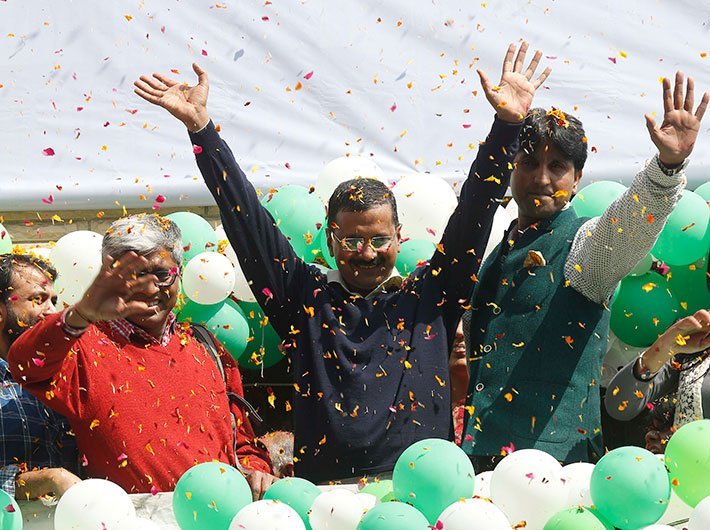The National Capital Territory of Delhi (NCTD) goes to polls on February 8, amid debates and protests for and against the amended citizenship law and the proposed National Register of Citizens (NRC). For the BJP, which has been out of power in the capital for 21 years, this will be a crucial fight, while for the ruling Aam Aadmi Party (AAP) of Arvind Kejrwal, this will an existential battle.
According to the Election Commission announcement of the schedule on Monday, the polls will be notified on January 14, vote will be cast on February 8, and the results will be out on February 11. The assembly’s term expires on February 22.
In 2015, Kejriwal’s AAP had bucked the trend, and defeated a BJP led by Narendra Modi within months of the historic 2014 Lok Sabha elections. The AAP sweep created a record of sorts, winning 67 of the 70 seats. In the previous year’s elections, it had won only 28 seats against the BJP’s 31, and had come to power with the help of the Congress (8). The party did not fare well outside the state, when it sought to contest elections in Haryana. Its performance in 2019 Lok Sabha elections was poor, coming third after the Congress.
After the surprising success of 2015, Kejriwal had started seeing himself as the prime challenger to the prime minister, and had been aiming to take leadership of the motley crew of anti-Modi forces. He, however, repeatedly got booed from sections of Delhi middle class whenever he criticized the central government. Also, the centre adopted a less than cooperative approach in matter of administration, hurting the AAP government’s governance measures and reducing them to looking like a bunch of amateurs.
Kejriwal then adopted a non-combative approach, mildly praised a couple of popular measures from the Modi government, and focused on welfare initiatives of the government, which are winning widespread praise. In his first budget, he had increased the budget for health and education by nearly 50 percent – something unheard of in India. The government, let jointly by deputy chief minister and education minister Manish Sisodia, changed the face of government schools, dramatically improving and expanding infrastructure, and more importantly, its performance. The government opened primary health centres, called mohalla clinics, in more and more neighbourhoods among other measures to make healthcare accessible to the poor.
Unlike the three terms of Sheila Dikshit which are remembered for enhancing Delhi’s urban infrastructure, with Metro and wider roads and flyovers, Kejriwal has focused on the matters of immediate concern for middle and lower middle classes.
His bugbear, however, is that the AAP has a legacy, from its agitation days, of aggressive and anarchic volunteers. The party has been beset by indiscipline, many popular leaders have quit and joined the BJP, and some have faced criminal charges. To compound the matters, Kejriwal himself exhibited authoritarian tendencies when he expelled three leaders from the party who represented liberal civil society.
Two of the three leaders, Yogendra Yadav, Prashant Bhushan and Anand Kumar, have formed an organization cum political party called Swaraj India, which failed to make a mark in civil elections. It is, meanwhile, at the forefront of the anti-NRC protests and gaining a degree of traction, even as the AAP has decided to maintain strategic silence.
For the Delhi assembly elections, its hopes are high, banking on the trend of well-organised regional parties beating the BJP in assembly polls. Observers believe his party may not have the kind of rapport it had with wider population during its heydays of the 2015, banking on its origins as a popular movement against corruption, yet its pro-poor performance, especially on health, education and utilities like water and electricity, has kept its “vote bank” intact. A loss in Delhi, on the other hand, can put a question mark on the AAP experiment.
For the BJP, the Delhi polls comes within months of its sagging numbers in Haryana and Maharashtra, where it failed to achieve majority amid Modi’s popularity and middle-class support to his government’s nationalistic measures. In Delhi, it has not won state elections since losing to the Congress in 1998, after which Sheila Dikshit went to complete three popular terms. The BJP has won all seats from the capital in the national elections of 2014 and 2019, and also swept civic elections, but remains to translate local as well as national gains at the state level.
Not having a widely acceptable candidate for the post of the chief minister is a handicap, as the older generation of established leaders has given way to younger leaders with limited base. The party will once again go to people, seeking votes in the name of the prime minister – a strategy that has failed most recently in Jharkhand. Before approaching the high-stakes battle of Bihar later this year, the BJP has to get its act together in Delhi. Also, for its unprecedented measures and plans regarding citizenship, the Delhi vote is going to be critical.
The Congress, the third major player, should have no hopes against the two mighty combatants, but its surprising performance in the 2019 Lok Sabha polls here, increasing its vote share, can revive its ambitions. But the chief hurdle for it is the absence of Dikshit, who died last year. Still, the 2019 polls showed that its individual candidates have nurtured their own pockets of influence.
